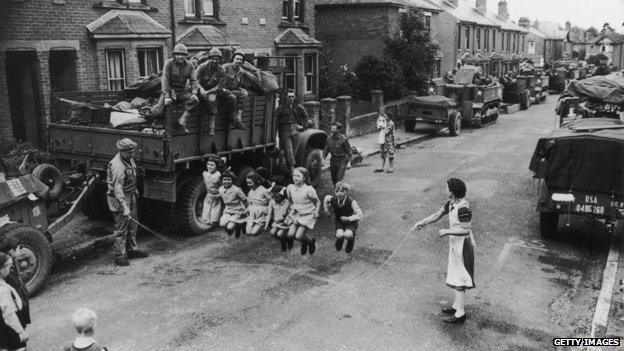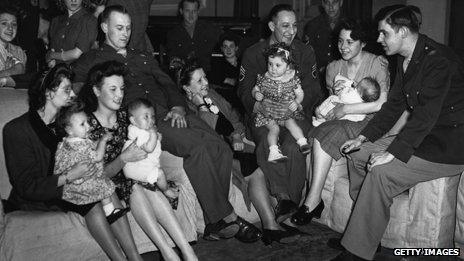How the GI influx shaped Britain's view of Americans
- Published

GIs had lots of downtime so would often entertain local children
It is now 70 years since GIs first landed on British soil to join their allies during WWII. Before the war, ordinary British people only knew Americans as the gangsters and heroes from the silver screen. They were in for a shock.
The first GIs landed on Britain's shores in 1942 and brought with them candy, Coca-Cola, cigarettes and nylon.
GIs were reportedly very generous. With average salaries more than five times that of a British soldier and no living expenses to worry about, there was plenty of time for parties.
GI veteran Lester Gaiter recalls: "We would crash their parties, drink their beer, flirt with their women".
And their generous nature made them alluring to women - around 70,000 British women became GI brides.
"The girls went mad. They never had such a good time. They had never been with fellows who had so much money," says Prudence Portman, who met many GIs during the war.
Children would flock around them and cry "got any gum, chum?"
Kenneth Pullen was 14 when the GIs arrived in London and remembers that it "came as a shock", because nobody knew "what an American looked like face to face".
He believed Americans would all be "very tall, immaculately dressed, run about the country shooting Indians, or shooting at policeman round Chicago…"
The reality, of course, was "completely different", says Pullen.
Even the Times newspaper explained to its readers in 1942 that GIs were "friendly and simple" rather than "Hollywood stars or two-gun Texans with five-gallon hats".
And stereotypes aside, a BBC poll in 1942 indicated that many Brits just did not know what to expect, saying: "Many people are simply without opinions of any kind, or even prejudices about anything so remote as America."
But the GI influx also brought social tension and introduced segregation.
Around 100,000 black American troops arrived in the UK during the war, far outnumbering the black population at the time - which may have been around 7,000. US troops were segregated in the UK as they were back home.
For many GIs, this was the first time they had travelled away from home.
"The whole variety of small-town Americans" was new to the British, says Prof Neil Wynn, a WWII historian from the University of Gloucestershire.
When the war was over about three million US soldiers had passed through Britain. So how did the wartime years change how Britons saw Americans?
GIs were frequently described as "overpaid, oversexed and over here". The GIs retorted and said the British were "underpaid, undersexed and under Eisenhower".
Despite a common language, the two nations quickly noticed differences. Women reported that the GIs had odd eating habits, flaunted their money and said that they could be boisterous and brash.
"They didn't know the British way of not showing your money, they would leave their money on pub counters," says Dorothy Kane.

Many British women married GIs and emigrated to the US
Perhaps surprisingly for a country at war, entertainment increased. GIs hosted parties, charming many women in the process. But girls who spent too much time with GIs were sometimes called "Yankee bags" - and estimates suggest around 9,000 war babies were born out of wedlock as a result of these liaisons.
A Home Office report in 1945 reported that girls saw the US as a "magic country" and that the American "proneness to spoil a girl" made them the most attractive boyfriends.
The GIs injected money into the economy which brought some relief from the misery of the time, says Wynn. This period also strengthened the "special relationship" between the UK and the US - a phrase introduced by Winston Churchill and echoed by many leaders since, Wynn adds.
They brought with them pinball machines, jukeboxes and the jitterbug.
Though American musical influences were already creeping into the UK, the regular dances held at American bases spread the popularity of R&B, blues and jazz. Such "edgy" music was never played on the BBC, says music historian Colin Larkin.
"They never did anything by halves," he adds.
Prof David Reynolds, from the University of Cambridge and author of The American Occupation of Britain, says that personal contact with GIs quickly "penetrated beyond the movie image of glossy Americans into a discovery that they were human beings, warts and all".
But he says that "there was often a lot of resentment towards them, about the way they would throw their money around indiscriminately".
Many though, especially women, loved American culture - the music and consumerism, and had a view of "America as an ideal", says Wynn.
But Reynolds notes that the more conservative Britons worried that the spread of American consumer culture was "undermining and eroding" British values.
GIs, with their salaries, swish uniforms and flirtatious nature, symbolised the "gradual dominance of the US in the alliance", adds Reynolds.
"The war was part of the larger pattern of how the US continued to shape British culture, that some people have welcomed and some have detested."
Today respective leaders of the US and the UK still talk about the "special relationship" that started during WWII, and though it irks some, Americanisms still pervade British language, just as Britishisms are creeping into American language.